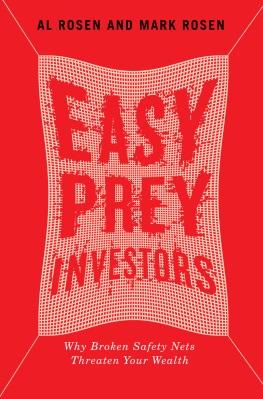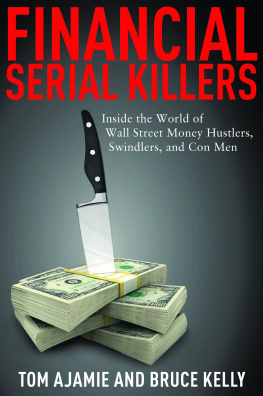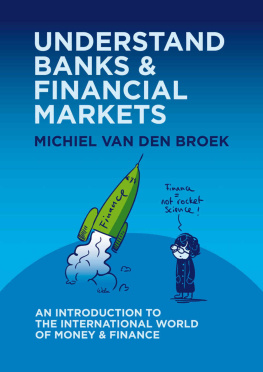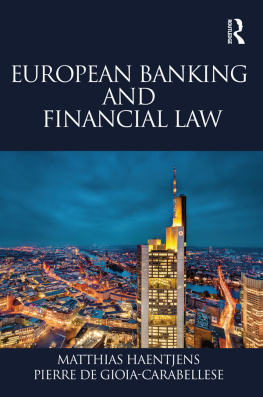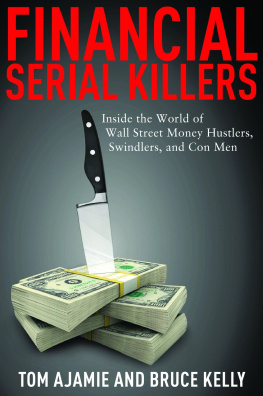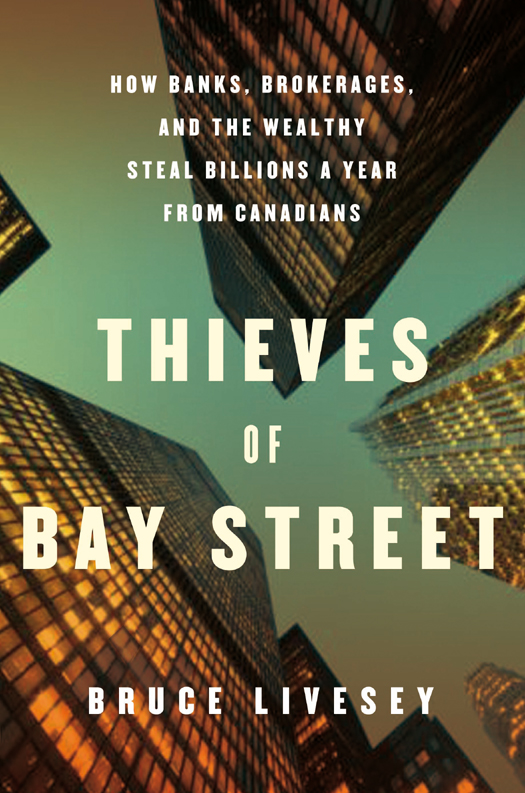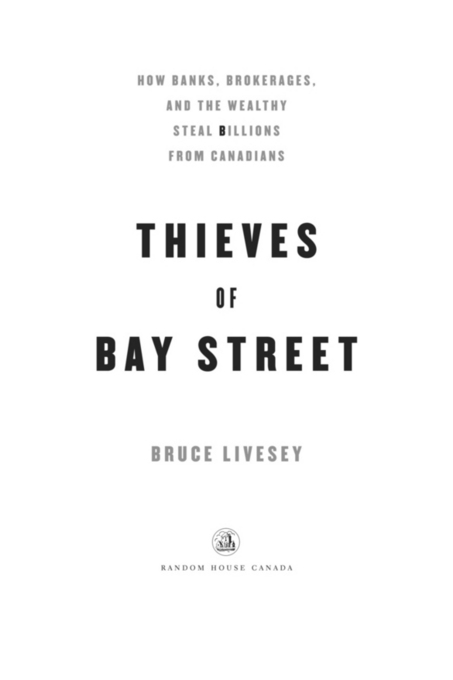PUBLISHED BY RANDOM HOUSE CANADA
Copyright 2012 Bruce Livesey
All rights reserved under International and Pan-American Copyright Conventions. No part of this book may be reproduced in any form or by any electronic or mechanical means, including information storage and retrieval systems, without permission in writing from the publisher, except by a reviewer, who may quote brief passages in a review. Published in 2012 by Random House Canada, a division of Random House of Canada Limited, Toronto. Distributed in Canada by Random House of Canada Limited.
www.randomhouse.ca
Random House Canada and colophon are registered trademarks.
Library and Archives Canada Cataloguing in Publication
Livesey, Bruce
Thieves of Bay Street : how banks, brokerages and the wealthy
steal billions from Canadians / Bruce Livesey.
eISBN: 978-0-307-35965-0
1. Banks and bankingCorrupt practicesCanada. I. Title.
HG 2704. L 59 2012 332.10971 C 2011-904095-6
Cover design by CS Richardson
Image credits: Guy Vanderelst/ Getty Images
v3.1
For Gabrielle,
the love of my life, who has made
all of this possible.
CONTENTS
INTRODUCTION
The rich are different: they are more ruthless.
economist Sam Khater
Fuck my victims.
Bernie Madoff, Ponzi swindler
M Y G OD, THATS DISGUSTING, said Alice Campbell, wiping away a tear. That just blows me away, it really does. Theres no justification, theres no justification for that. The greedits unbelievable.
You think thats what it isgreed? asked Gillian Findlay.
Yes, I believe that. Its total greed. Thats all it is, replied Campbell.
It was November 2009 and Findlay, a veteran television reporter with the Canadian Broadcasting Corporation (CBC), was interviewing Campbell at her one-storey home in the bedroom community of Georgetown, Ontario. A sixty-year-old grandmother and former plant worker at Nortel Networks Corp., Campbell was immobilized due to botched back surgery she had undergone in 1987 and was in desperately poor health when Findlay and I visited that fall. She had diabetes and a weak heart, and needed oxygen from a portable tank. The ventilator and a kaleidoscope of pills for her various ailments were costing her $800 a month.
Nortel had gone bankrupt the previous winter and Campbell was one of the 400 former Nortel employees in Canada whose long-term disability incomewhich in her case amounted to $1,100 a monthwas going to disappear as a result. Adding to her woes was managements removal of $103 million from the companys health and welfare fund, which meant her pension would be woefully inadequate. Campbell and her retired husband faced a daunting future: even with the disability income, they were barely scraping by.
But insult was about to be added to the former plant workers injury. As a producer with the CBCs Investigative Unit, Id been leaked an internal document which revealed that seventy-two executives and managers still employed by Nortel had quietly awarded themselves US$7.5 million in bonuses, and that was on top of US$45 million in bonuses promised to the companys managers earlier that year. Nortel had gone bust, losing tens of billions of investors dollars and laying off most of its staff, and now the bosses appeared to be rewarding their own failure. When we showed Campbell the document, she was understandably outraged: her once-proud employer had gone to the dogs, in her view, and left people like her to the wolves.
With annual revenues of $9 billion and shares selling at $120, by the mid-1990s Nortel had become Canadas pre-eminent high-tech multinational, praised as a paragon of innovation and a surefire investment, and few forward-thinking Canadian investors didnt hold Nortel stock. The corporation was the talk of the town on Torontos Bay Street, Vancouvers Howe Street, in the financial districts of Montreal and Calgary, and at Tim Hortons outlets across the country. Later in the decade, however, Nortels senior management began messing with the books, giving investors a fraudulent picture of the companys financial health. While this manipulation of numbers fattened executives bonuses and stock option plans, it would eventually engulf the company in scandal and send it into a fatal tailspin. By 2007, the Ontario Securities Commission (OSC), the U.S. Securities and Exchange Commission (SEC) and the RCMP had charged eight of Nortels former top executives, including one CEO and a chief financial officer, for fraud and the company was forced to pay nearly $3 billion to settle investors lawsuits. It would not recover.
The demise of Nortel was but one more outbreak in a widespread epidemic of executives enriching themselves at the expense of investors and employees. In case after case, companies had cooked their books, falsified quarterly reports and inflated share prices; then, after the firms went bust, bankruptcy receivers moved in and sold off the pieces, usually to foreign bidders who, in turn, moved key research and development and management jobs offshore. The worst of this corporate culture caused the 20072009 credit crisis and the near-total meltdown of the global financial system, a debacle initiated by bankers and traders and hedge fund managers who peddled bogus investment products to unsuspecting investors. Banks and brokerages in the United States and across Europe collapsed or required government bailouts, and by 2012 the value of total writedowns and losses resulting from the global crash had surpassed $4 trillion.
The credit crisis exposed the moral turpitude of a financial industry more than happy to sell products that would destroy its own business and ruin its customers along the way. If it wasnt short sellers driving up oil prices by as much as $60 a barrel in 2008 (as they would again in 2011), exacerbating the post-crash recession and causing food shortages in some parts of the world, it was revelations about the worlds most powerful investment bank, Goldman Sachs Group Inc., that great vampire squid wrapped around the face of humanity relentlessly jamming its blood funnel into anything that smells like money, as Rolling Stone described it. Goldman grew adept at selling securities to investors based on pools of mortgage debt. They would then conspire with hedge funds who shorted those very same pools: that is, Goldman was betting that its own lousy product would collapse so they and the hedge funds could cash in on their investors losses.
While this house of cards was tumbling down in the United States, Canadas $6.3 trillion financial sector (which is the total value of our capital markets) seemed to be weathering the storm. The nations chartered banks and brokerage houses had remained solvent and some important people noticed. As Andrew Coyne remarked in Macleans magazine in 2009, One of the odder turns in the financial crisis has been the emergence of what can only be described as a worldwide cult of the Canadian banks.
The Financial Times called Canadas banks the envy of the world, and no less than U.S. president Barack Obama, former Federal Reserve chairman Paul Volcker and Newsweek editor Fareek Zakaria piled on the praise. Even Nobel Prizewinning economist Paul Krugman, under the headline GOOD AND BORING , added to the hype in his New York Times column: We need to learn from those countries that evidently did it right. And leading that list is our neighbor to the north. Right now, Canada is a very important role model.




